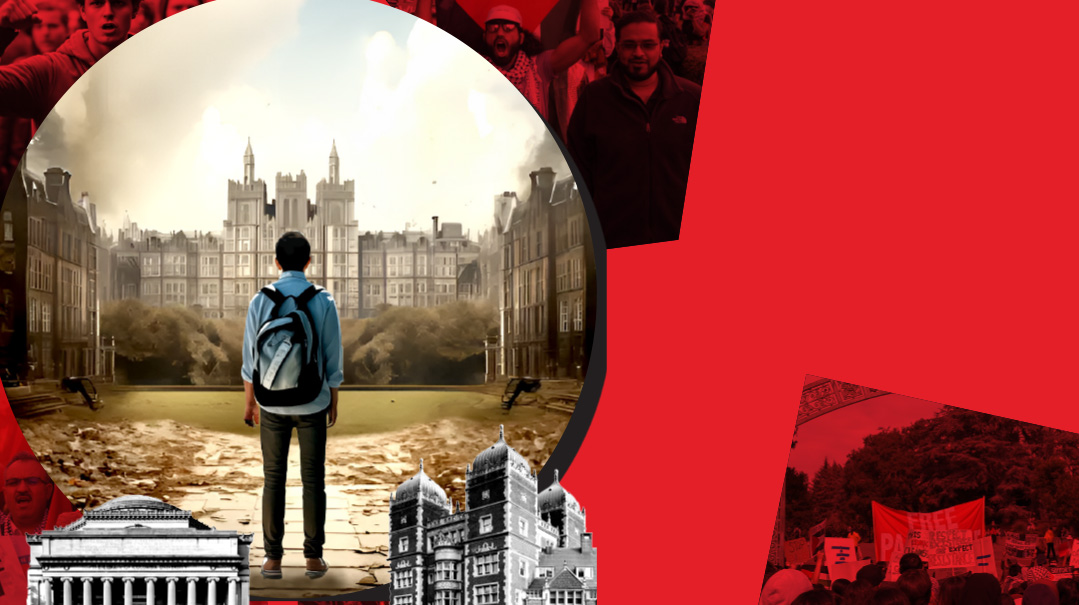Schooled in Hate
| November 7, 2023Jews on university campuses face a wave of hatred

Photos: AP Newsroom
It’s been a long time since colleges kept up their appearance as institutions dedicated solely to education and pursuit of truth. These days, universities are hotbeds of liberalism and progressivism, immersed in woke culture. Still, while Jewish students may not have felt perfectly comfortable on campus, it took October 7 for them to realize their fellow non-Jewish students wanted to see them dead
The walk from class to Princeton’s kosher cafeteria for lunch usually takes me ten minutes.
But on Wednesday, October 25, instead of heading to lunch, I approached a beautiful grassy area in front of the main campus center. Dozens of my fellow Jewish students stood silently behind a white plastic fence, holding Israeli flags and pictures of hostages. On the other side, a few hundred people chanted, roared, and pumped their fists in the air.
“They sounded like kindergarteners,” I told my family later. Two student organizers holding megaphones paced in front of the crowd, gleefully cheering. “Brick by brick, wall by wall, apartheid has got to fall,” they shouted. And then: “Intifada, intifada, long live the intifada.”
I felt my heart racing. I stared at them, then at the other Jews, in disbelief. The chants went on.
The Painful Truth
College is a messy place.
It’s a rite of passage for millions of Americans. It’s a place where progressivism, the assimilation crisis, and the declining mental health of today’s youth are vividly, painfully on display.
Hundreds of thousands of Jewish students attend colleges across North America each year. Some of those students are religious; most are not. Some encounter Hillel houses, Chabad houses, Birthright recruiters, and kiruv programming, while others never do.
In some institutions, students dorm for four years straight, living with non-Jewish roommates and eating in communal cafeterias. At others, students commute to campus or attend class on Zoom. Some students might do their own research, land prestigious internships, or go on to graduate school; others might play sports, join clubs, or support themselves by working full time.
Whether they grew up in public school or Bais Yaakov, all Jewish students come into contact with non-Jews.
But before October 7, very few believed those non-Jews wanted them dead.
In the four weeks since the war’s outbreak, Jewish communities across the world have experienced alarming hatred. The ADL reports that anti-Semitic incidents in the United States have increased by nearly 400 percent compared to last year; the statistics are far worse in other countries.
Campuses have long been known as hotbeds of radicalism — slices of real life where impulsive young people can experiment with the future. Activism has surged in the past decade, and today’s students are opinionated, vocal, and quick to take sides: signing impassioned group letters, posting on social media, and making extreme demands.
Ironically, despite their passion, a recent poll found that Americans aged 18–24 were the least knowledgeable about the war in Israel. But 48 percent of them said they would side with Hamas. And across the country, they’re making this known in terrifying ways.
For Jewish students on campus, life is different now.
Highly publicized incidents are everywhere you look: a Cornell professor supporting Hamas, a Columbia student assaulting an Israeli fellow student with a stick, Cooper Union students sheltering in a library as protestors bang on the door, a mob surrounding a Jewish student at Harvard, swastikas in an American University dorm, a man spitting on the word “Jewish” outside of NYU.
Unfortunately, these news stories are just the tip of the iceberg, and they keep coming.
I spoke to twelve students at eight American colleges about their recent experiences.
Oops! We could not locate your form.







